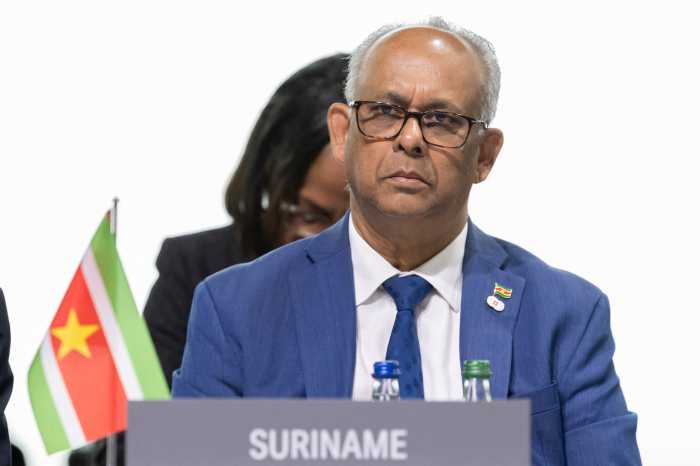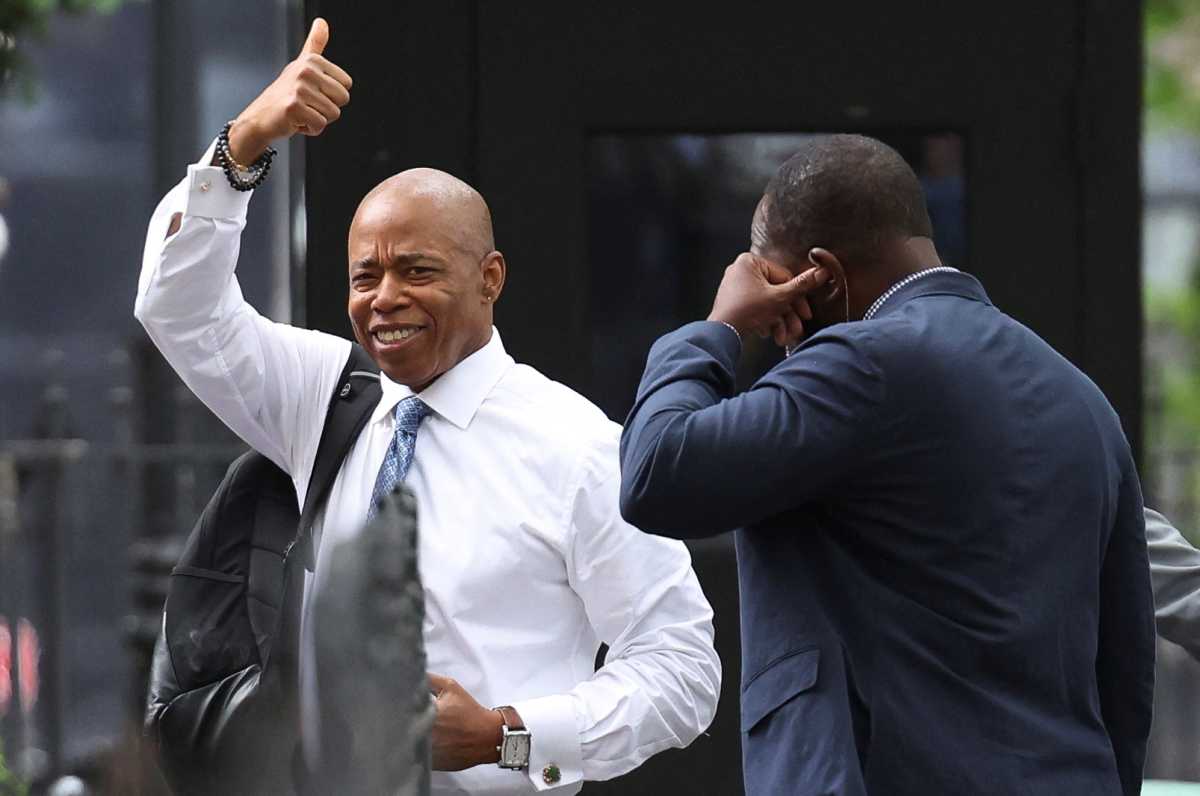Caribbean
The Eastern Caribbean Bank (ECCB) is boasting that, for the 39th year, the Eastern Caribbean Currency has been pegged to the US dollar at a fixed rate of EC$2.70.
The rate for the last financial year was disclosed by the Deputy Governor of the ECCB Trevor Braithwaite, who said this means the currency is doing well.
The EC dollar has been pegged to the US dollar since 1976, and that peg is the anchor that gives investors and citizens of the Eastern Caribbean certainty and confidence in the stability of the currency which is used by eight member states.
Braithwaite added that the backing ration of the EC dollar is high up in the 90 percentile.
“The EC dollar is as strong as ever. The backing ration of the EC dollar is above the legal administrative limit,” he said.
The EECB agreement regulates the levels of foreign currency reserves that the bank should hold and it also regulates the calculation for the backing of the foreign currency.
“The foreign reserves we hold are obtained from the influx of foreign currency into the region so it will either be by export. If our countries continue to export items to other countries and they are paid in foreign currency, it is pooled into a reserve, the deputy governor said.
The EC dollar is the official currency for Anguilla, Antigua & Barbuda, Dominica, Grenada, St. Kitts, St. Vincent and the Grenadines and St. Lucia.
Antigua
A new baggage claim regulation, which allows residents spending two nights or more outside of the country to import US$200 worth of goods, free of duty, upon their return, is in place at the Customs and Excise.
The regulation, and amendment of the 1999 law, which allowed for $700 allowance on non-commercial items bought overseas by returning residents, per quarter, also includes “generous allowances” for visitors of all ages to the island, returning students and other professionals.
“What we did promise, we re-drafted an elaborate baggage regulation which has been approved by the government and it has been gazetted and comes into force immediately,” the Comptroller of Customs Raju Boddu said in an interview on OBSERVER Radio’s Patrol Duty.
Bahamas
Foreign Affairs and Immigration Minister Fred Mitchell said the Bahamas is dealing with a “deluge of illegal migrants.”
Recently, more than 200 undocumented Haitian migrants were apprehended. “I wanted to inform the public that we have been dealing with a deluge of illegal immigrants who have breached our borders over the past week,” Mitchell said in a statement.
“We are working to expedite their immediate return to Haiti,” he said.
He was referring to two separate illegal landings recently.
Among those apprehended were 37 children — babies six to nine months — and 168 Haitians in waters of Bimini on a 50-foot sloop. While contributing to the Immigration (Amendment) Bill in the Senate recently, Minister of State for National Security Keith Bell expressed concern about migrants traveling up the coast of Cuba to northern islands of the Bahamas and Bimini.
Barbados
Scientists from the National Oceanic and Atmosphere Administration (NOAA) in the United States will begin a series of dives to investigate sections of the Caribbean Sea and Atlantic Ocean that have never occurred before.
Scientists aboard the NOAA ship Okeanos Explorer have embarked on a mission that can be followed online.
According to the NOAA, the dives are expected to go as deep as 3.7 miles and the unnamed submarine will broadcaast live video from the seafloor allowing anyone with net access to watch the exploration as it unfolds.
“We’ll be exploring an area of the United States Exclusive Economic Zone that scientists know very little about,” said Alan Leonardo, director of NOAA’s Office of Ocean Exploration and Research, the federal program responsible for coordinating those expedition.
As many as 40 scientists ashore are expected remotely in the expedition.
Cayman Islands
Cayman Islands and Cuba have signed a new memorandum of understanding (MoU) which they say will help speed up the process of repatriating migrants who land illegally in the territory.
Few details of the agreement have been released, with Cayman Islands officials saying only that it “outlines a more efficient reparation process for irregular Cuban migrants.”
Discussions between the two countries have been ongoing for the past two years, with Cayman Islands authorities anxious to reduce the escalating cost of detaining increasing number of migrants arriving on Cayman’s shores in makeshift boats.
A large jump on the number of migrants passing through Cayman in 2015 has put a new focus on the problem with the detention center at Fairbanks approaching maximum capacity throughout March and April.
More than 160 Cuban migrants were estimated to have shown up in Cayman’s waters in the first three months of 2015, compared with 24 per month in 2014 and four per month in 2013.
The current MoU, signed in 1999, commits Cayman official to a series of enforcement actions once Cuban migrant boats appear in local waters, including a time frame for returning the migrants to Havana.
The Cayman Islands government spent $1.6 million last year on the detention, housing and repatriation of Cuban migrants, who arrived illegal on the island.
Guyana
Marriott Hotels in Guyana made history with the opening of its first in the South American country.
The international chain is the first major brand to come to Guyana in more than 45 years.
Operating under the flagship brand Marriott International, INC, the 197-room Guyana Marriott Hotel Georgetown opens at a time when investor confidence is at an all-time high and with the country turning out a balance sheet of a 10-growth trajectory for four percent per annum.
Built at a cost of US$58 million, the new investment is expected to realize returns of 11 percent per annum, Finance Minister Dr Ashni Sigh said.
The property is owned by Atlantic Hotel Incorporated, a government agency. The private sector shied away from the project because of legal wrangling between the opposition and the government, which remains before the courts.
Marriott will also oversee the construction of a 20,000-square-foot entertainment complex and a casino in Guyana. Both entities will complement the hotel.
Haiti
The United Nations Security Council says it is awaiting a “comprehensive investigations” into the death of one of its peacekeepers in Haiti.
In a brief statement, the Security Council said the Chilean nationals were killed during an attack on a vehicle of the UN stabilization mission on the French-speaking CARCIOM country.
The statement gave no details of the incident that led to the death, but said the Security Council was awaiting a “comprehensive investigation to determine the facts and circumstances of the incident.”
Media reports indicate the soldier was killed along Haiti’s border with the Dominica Republic and that he was helping to provide security during a demonstration when the UN vehicle was fired upon.
The United Nations Stabilization Mission in Haiti has been in operation on the island since 2004.
St. Kitts and Nevis
Police are searching for the killer/killers of a senior official of the Bank of Nevis, whose body was found in his car outside his home last weekend.
Police and Press Relations Officer Lyndon David confirmed the murder of Everette Hanley, credit manager of the Bank of Nevis and urged persons with information to help law enforcement authorities to solve the case.
Hanley’s killing is the fourth in Nevis, and the second in less than two weeks.
Meanwhile, police are investigating the death of Jeffrey Daniel, 42, who was shot and killed at his home recently.
Daniel’s death brings the number of homicides to 14 in St. Kitts and Nevis so far for this year. The twin-island Federation recorded 24 murders last year.
Trinidad
A report laid in Parliament in the Trinidad and Tobago over the unprecedented day of “total policing” has called for the acting police commissioner and the three deputy commissioners to formally apologize to the nation.
The report , which was presented by retired Brigadier General Carl Alfonso, who is acting as minister of National Security also recommended a Commission of Enquiry into the activities of police officers on March 23, 2015.
The “total policing” led to a massive gridlock on the nation’s roads, forcing schools to close, operations at hospital to be postponed and business to close.
The report pointed to the command breakdown on the day in question and the investigators criticized the head of the Special Branch, another Special Branch officer and TV6 Beyond the Tape co-host Inspector Roger Alexander.
It also recommended that officers who did not participate in the exercise be commended publicly for not pursuing a measure, which caused tremendous frustration for the people of the country.
— compiled by Azad Ali
























